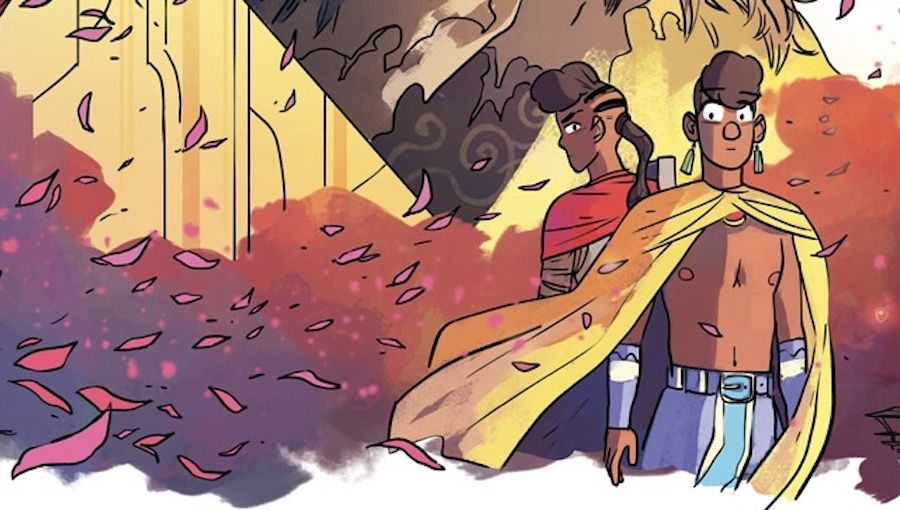Equilibrium is either achieved or maintained, it doesn’t just happen.
The characters in the first Scales and Scoundrels lost a lot of themselves in the tunnels leading to Dened Lewen, an ancient and complex fastness that was rumored to hold untold riches. They also, in those dark spaces beneath the world, found something, as well. Each of the three parties – Dorma the Dwarf, Akisbjorne and his Shadow Koro, and, of course, Lu (a dragon bound in human form) – went through a different experience down below, though they were all together dealing with the same events. Life is like that: We’re all on personal journeys, the sum of our lives to each point we reside in and how things affect us is unique to ourselves. The fact that the creators can put these divergent foci on the page is the work of masterful storytelling. And now, they present a tale of a child returned, a secret sought, and a tradition upheld that each allow us to explore the differences in the characters and what their adventure truly meant to them all.
Sebastian Girner gives us three tales, with the second two woven together lovingly. First, though, we follow Dorma home to inter the remains of her brother Dorma in the crypts of her hometown. This return is hard for her, as it was a place that she and her brother had both escaped, but tradition brings her back to a family and a community that spurns her and reveres her brother. Exploring several themes about love, loss, and what the boundary of death means to culture and how people are remembered, we’re treated to a journey of discovery, danger, and proof of self. Dorma is tired of proving herself to everyone she knows just to be allowed to exist in her space, but when events take a sudden turn, it’s just what she does, though she finds out that she doesn’t need to for herself anymore. He then turns to Lu, seeking information to address her condition, and nearly paying for it with not only her life, but those that would help her, as well. Dolan makes a return to stymie the search and end the struggle for her, but she manages to show off a few more skills than we’d seen before.
Finally, we reach the heart of this book: the titular Festival of Life. Lu meets up once more with the Prince and his Shadow as they preside over a meeting of many disparate tribes that live in the desert who keep to themselves for the most part, except for the one time of year when they come together as one under the leadership of the court. A delicate balance is always negotiated during this festival, but someone wants to use it to destabilize everything that Aki’s people have worked so hard for. Lu is an agent of chaos, especially in the eyes of Koro, but she does everything that she can to help them save the festival and, perhaps, their people. There’s a rich heritage that Girner builds for us in this work, making the world seem much bigger than we get to see in the pages. He truly knows how to distill his story without sacrificing the rich and engaging details that make the world such an enrapturing whole. There is enough structure balanced with mystery to leave you wanting more whilst still satisfying the narrative.
I think that Galaad’s art style is incredibly expressive and keen, with the ability to drive the focus, as well as any script alone. The brutal styling of the Dwarven city is forgotten in the desolate library in the snowy wastes, and just as much attention is paid to the rich desert landscapes. The character designs continue to shine, each person unique and interesting to watch, and the expressive work on top of it all leaves no emotion hidden for long. Without giving anything away, there is a moment in the climactic scene that will cut you down completely, a betrayal wrought so very raw that the page nearly bleeds from the incredible composition. Each of the locales is rich with wonder and majesty, conveying the age of the spaces better than any text could. The spirit of antiquity flows freely through all of the landscapes while the contrasting of the pacing and needs of the characters creates a rich dichotomy that grounds the story in a world that matters. It’s the heavy burden of our protagonists to act against their fellows and the world at large, and the stakes are monumental.
Scales and Scoundrels is an amazing use of fantasy to study ourselves. It’s a place where everything is heightened enough that the underlying currents of history and the behavior that we see every day can be exposed and relevant to us without our own societal blinders blocking the way. These are organic beings with feelings and flaws and all of the messy stuff that makes us, and, because of that, you cannot keep from rooting for them. This is truly an epic in the making, and I look forward to the next in the series, as well.
Share the stories that move you.
Creative Team: Sebastian Girner (Writer), Galaad (Artist), Jeff Powell (Lettering and Design)
Publisher: TKO
Click here to purchase.

